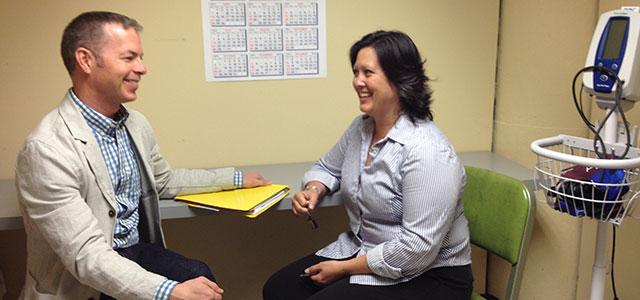
Matt Tierney and his NP colleague, Jadine M. Cehand
What Volunteer Clinical Faculty Do: Matt Tierney and Psychiatric Nursing
Volunteer clinical faculty and preceptors offer students individual perspectives and hands-on experience in a variety of health care settings and specialties. The cumulative effect of what these volunteers impart plays a significant role in the care any health system delivers. This series aims to shed light on the unique roles these valuable mentors play.
This month we hear from Matt Tierney, psychiatric nurse practitioner at San Francisco General Hospital and administrative director of the Office-Based Buprenorphine Induction Clinic (OBIC) and the Centralized Opiate Placement Evaluation (COPE) Program.
My first career was as an artist – a painter. In my 20s I spent so much time alone with my work, I missed human interaction. I also began to realize that the artist’s retirement plan wasn’t so good.
I remembered having worked as an athletic trainer in college; I’d loved the hands-on aspect of it. I was drawn to hands-on work, so I decided to pursue something that involved that. I was trained as a medical assistant with Haight Ashbury Free Clinics, and while I was there I was so impressed by the nurse practitioners who worked there. Their level of patient care was astounding. They were trained to respond to the whole patient, not just the illness. It really inspired me, and I joined the MEPN [Master’s Entry Program in Nursing] program at UCSF.
Initially, I wanted to focus on health care for the homeless and underserved populations. My first job was with San Francisco General Hospital (SFGH), Department of Psychiatry, in the Division of Substance Abuse and Addiction Medicine. I did the interview there, and I’ve been with them ever since. Today I am also the director of two outpatient clinics housed by UCSF. The first, Centralized Opiate Placement Evaluation Program, or COPE, provides appropriate assessment and referrals for our patients with substance abuse and mental health disorders. The second, Office-Based Buprenorphine Induction Clinic (OBIC), initiates novel opiate replacement therapies and aims to integrate them with public health services.
Both programs overwhelmingly serve disenfranchised, unhoused and opiate-dependent patients. I’ve always been quite compelled by this population from a nursing standpoint because they come to us with multiple issues; it’s a diagnostic puzzle. As nurses, we know that treatment does work for patients with substance abuse issues. Yet in these complex patients, treating the patient is just a portal – an entryway – to reach very intricate clients. That’s a lot of the reasoning behind the OBIC clinic, which is the first of its kind in the nation.
Nursing, like life, is very dynamic, so our careers should be dynamic as well – that’s why in addition to my clinical work, I enjoy taking on students. The students who come to me from UCSF are bright, challenging and hungry for knowledge; it’s wonderful to watch them develop. In general, student nurses have a good sense of their abilities and their deficits, and they come to round out their skill set. I try to get the students to address what the patients really need. And I want them to learn not just how to give exams, but also how to work with patients in discomfort. I share with them the importance of building and enhancing their sensory tools, because in nursing we rely on these a great deal.
Working with students is a delicate balance of autonomy and care. I seek to encourage students to become confident in what they can already do, but also prepare them to fill out where they are lacking. I always make a point of being open to students’ questions because, sometimes, they are one or two steps ahead of me, and I end up thinking about something in a new way. It reminds me that nursing is a lifelong learning profession.



